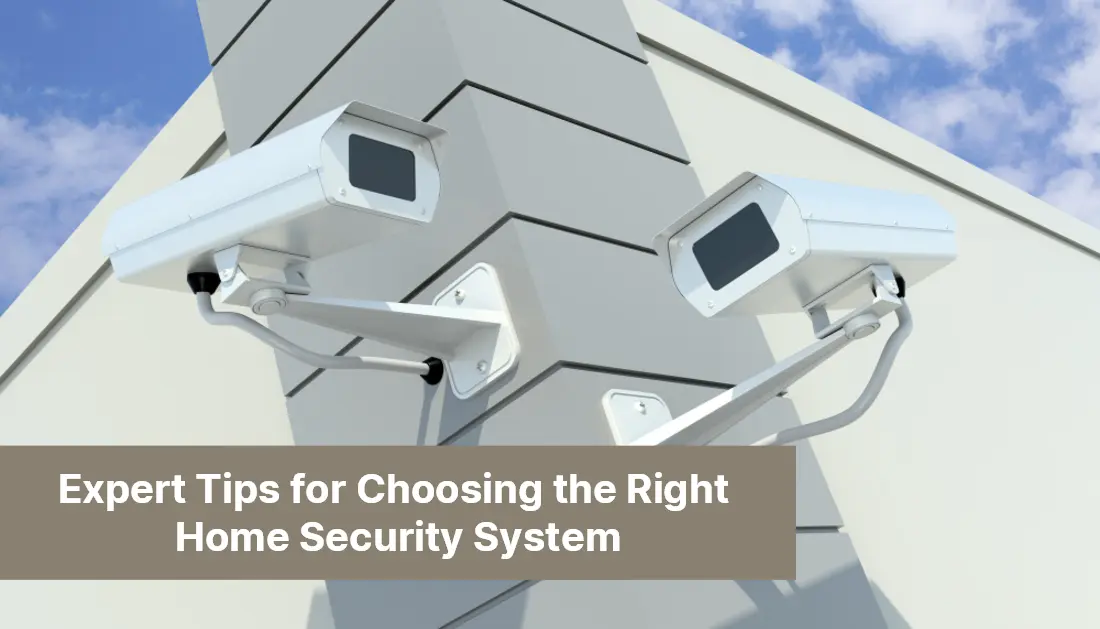
27 May Expert Tips for Choosing the Right Home Security System for Your Family
Your home is your sanctuary, your safe haven, and the place where you and your family feel most secure. However, with crime rates on the rise, it’s becoming increasingly important to invest in a home security system that can protect your loved ones and your property from potential threats. But with so many options available, deciding on the right home security system can be overwhelming. That’s where expert tips are helpful. In this article, we’ll share with you some of the best advice from the pros on how to select the perfect home security system for your family’s unique needs. From understanding the different types of systems available to evaluating your home’s vulnerabilities, we’ll cover everything you need to know to make an informed decision and provide you with peace of mind knowing that your home is well-protected.
Why Do You Need a Home Security System?
Before we dive into the different types of home security systems, let’s first discuss why you need one in the first place. The most obvious reason is to protect your home from burglaries and break-ins. According to the FBI, there were 1.2 million burglaries in the United States in 2019, resulting in an estimated $3 billion in property losses. A home security system can deter burglars from entering your home, and if they do, it can alert you and the authorities to act.
But home security systems can also protect your family from other potential dangers, such as fires and carbon monoxide leaks. Some systems come with smoke detectors and CO sensors that can automatically alert emergency services in case of an incident. Additionally, having a home security system can lower your homeowner’s insurance premiums, as insurance companies consider it a preventative measure against potential losses.
Overall, a home security system provides peace of mind knowing that your home and loved ones are protected against potential threats. Downtown Computer Services helps you secure your home with a security system with 24/7 video surveillance and Wi-Fi HD cameras around the perimeter. Call us now by phone (954) 524 9002 or send us a request for a free consultation.
Types of Home Security Systems
There are several types of home security systems available, and each has its benefits and drawbacks. Here are the most common types:
Wired Systems
Wired home security systems are hardwired into your home’s electrical system and connected to a central control panel. They typically require professional installation, and the wires are hidden inside the walls. While wired systems are more reliable than wireless options, they can be pricier and difficult to install.
Wireless Systems
Wireless home security systems use radio frequencies to communicate between the sensors and the control panel. They are easier to install than wired systems and can be moved from one location to another. However, they can be less reliable than wired systems, as their signals can be disrupted by other devices that use similar radio frequencies.
Hybrid Systems
Hybrid home security systems combine the benefits of wired and wireless systems. They use a combination of hardwired and wireless sensors, and the control panel can be connected to a mobile device for remote monitoring. Hybrid systems are more flexible than wired systems and more reliable than wireless options.
DIY Systems
DIY home security systems are becoming increasingly popular, as they are easy to install and often more affordable than professional options. They typically come with wireless sensors that can be placed around your home and connected to a mobile app for monitoring. While DIY systems are convenient, they may not be as reliable as professional options, and you may miss out on features such as professional monitoring.
Factors to Consider When Choosing a Home Security System
Now that you’re familiar with the different types of home security systems, it’s time to consider which one is right for you. Here are some factors to keep in mind when making your decision:
Home Size and Layout
The size and layout of your home can impact which type of home security system is best for you. If you have a large home with multiple floors, you may need a system with more sensors to cover all areas. If your home has many entry points, such as windows and doors, you may need more sensors to detect potential breaches.
Budget
Home security systems can range from a few hundred dollars to several thousand, depending on the type and features. Consider your budget when choosing a system, and keep in mind that some systems may require ongoing monthly fees for monitoring services.
Monitoring
Professional monitoring services can provide an added layer of protection for your home. If your system detects a potential threat, the monitoring center can alert emergency services on your behalf. However, professional monitoring services can be pricier than self-monitoring options.
Features
Home security systems come with a variety of features, such as motion sensors, cameras, and smart home integration. Consider which features are most important to you and your family’s needs.
DIY vs. Professional Installation
Do you want to install your home security system yourself, or would you prefer it professionally installed? DIY systems are more affordable, but professional installation can ensure that your system is set up correctly and functioning optimally.
Do you need help selecting the right CCTV security system for your home?
Downtown Computer Services will provide advice on selecting security components based on your budget and security plan. Call us right now at (954) 524 9002 or send us a request for a consultation.
Features to Look for in a Home Security System
Here are some features to look for when choosing a home security system:
Motion Sensors
Motion sensors can detect movement in your home and alert you and the authorities to potential intruders. They can also be used to trigger other devices, such as lights and sirens.
Cameras
Cameras can provide visual evidence of potential intruders and can also be used for remote monitoring of your home.
Door and Window Sensors
Door and window sensors can detect when a door or window has been opened and can trigger an alarm.
Smart Home Integration
Some home security systems can be integrated with smart home devices, such as Amazon Alexa and Google Assistant, allowing you to control your system with voice commands.
Mobile App
A mobile app can allow you to monitor your home security system from anywhere, receive alerts, and control your system remotely.
Top Brands of Home Security Systems
There are many brands of home security systems available, but here are some of the most popular:
ADT
ADT is one of the most well-known and established home security brands. They offer a range of wired and wireless systems, as well as professional monitoring services.
SimpliSafe
SimpliSafe is a popular DIY home security system that is easy to install and affordable. They offer a range of sensors and cameras and do not require a long-term contract.
Ring
Ring is a popular brand of wireless home security systems that also offers video doorbells and outdoor cameras. They offer both DIY and professional installation options.
Nest
Nest offers a range of smart home devices, including home security systems. Their systems are easy to use and integrate with other Nest devices.
Professional Monitoring vs. Self-Monitoring
When it comes to monitoring your home security system, you have two options: professional monitoring or self-monitoring. Here are the differences between the two:
Professional Monitoring
With professional monitoring, your home security system is connected to a monitoring center that can alert emergency services on your behalf if a potential threat is detected. Professional monitoring can provide an added layer of protection, but can be pricier.
Self-Monitoring
With self-monitoring, you are responsible for monitoring your system and responding to alerts. While self-monitoring can be more affordable, it may not provide the same level of protection as professional monitoring.
Installation of Home Security Systems
The installation of your home security system will depend on the type of system you choose. Wired systems typically require professional installation, while wireless and DIY systems can be installed by the homeowner. If you select professional installation, make sure to decide a reputable provider and ask about their qualifications and experience.
Maintenance and Upgrades
Your home security system will require regular maintenance to ensure that it is functioning optimally. This may include testing sensors, replacing batteries, and upgrading software. Make sure to read the manufacturer’s instructions and follow their recommended maintenance schedule.
Cost of Home Security Systems
The cost of a home security system will depend on the type of system you decide on, the features you select, and whether you opt for professional monitoring services. On average, a home security system can cost anywhere from a few hundred dollars to several thousand. Make sure to consider the upfront costs as well as any ongoing monthly fees for monitoring services.
Conclusion
Investing in a home security system is a smart decision for any homeowner looking to protect their property and loved ones. With so many options available, it’s important to choose a system that meets your unique needs. Consider factors such as your home’s size and layout, your budget, and the features you require. Whether you opt for a wired, wireless, DIY, or hybrid system, make sure to choose a reputable provider and follow their recommended maintenance schedule. With the right home security system in place, you can enjoy peace of mind knowing that your home is well-protected.
Call us by phone (954) 524 9002 or send us a request for a consultation.
Check out other relevant news
- How Easy-to-Use Hacking Tools Are Fueling Cybercrime
- Cryptocurrency Security for Small Businesses: Protecting Your Wallet
- The Infostealer Epidemic: Protecting Your Business from the Latest Wave of Cyberattacks
- The Identity Crisis: How Compromised Credentials Can Cripple Your Business
- Beyond the Brick and Mortar: Building Your Online Storefront with Digital Marketing
